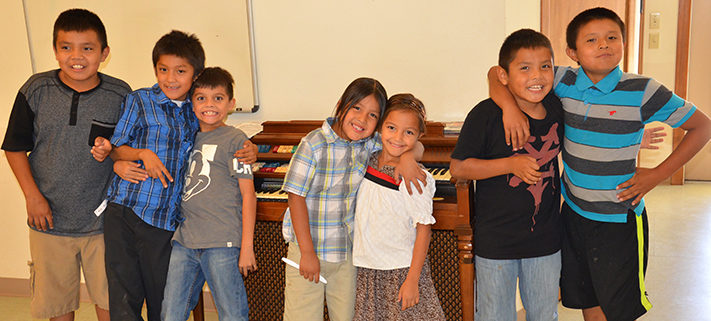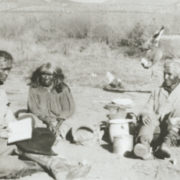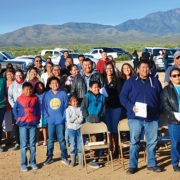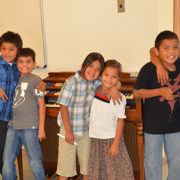Reaching Native Christians: Part 3
The Native American mission is training Native Christian leaders as it continues moving forward with the message of salvation.
Daniel J. Rautenberg and Debbie K. Dietrich
“Even if you’re on the right track, you’ll get run over if you just sit there.”
I can still see that inspirational quote from Will Rogers stuck to the painted cinderblock walls of my seventh- and eighth-grade classroom. Decades later, it crosses my mind as I share with you a vision for the future of WELS Native American missions.
We are still on the right track, the track that leads to heaven. That track is narrow and winding. It is also treacherous, as the traditional Apache medicine man lurks behind a bush, waiting to attack unsuspecting Christian travelers. But for 125 years, Native Christians in Apacheland have been walking the track with Jesus to heaven. By the grace of God, that has not changed.
And yet, danger is around us. If we “just sit there,” apathy, dependency, and even comfort threaten to overtake us. We need to recapture the mission spirit, renew our love for the lost, and take our rightful place in the long line of Christians who are dedicated to passing on the good news.
“Now is the time of God’s favor, now is the day of salvation” (2 Corinthians 6:2).
If Christ’s love is the engine that moves us forward, the Apache Christian Training School (ACTS) is the vehicle that will carry our native Christians into the future. Nearly 20 years ago, the missionaries and congregational leaders serving nine congregations and three schools on the Apache reservations realized something important. They were working faithfully, but they weren’t moving forward. In fact, at times it seemed as if the mission field was slowly losing ground. It was too easy to be comfortable telling the great stories of our past, rejoicing in the generous support of their brothers and sisters in WELS, and thanking God that the communities continued to receive the gospel from faithful servants. They needed to understand the purpose more clearly and trust that God has given all the gifts and potential they needed. To move forward, they resolved to train the people for service in God’s kingdom through the ACTS program.
God has blessed this work, with many Apache leaders taking classes today. Now our congregations are stronger. Ministry programs are being led by Apaches. Twenty-five percent of our called workers are Apache and more are in training.
And God is giving us opportunities. Five hundred more reservations need God’s Word! By most estimates, up to 95 percent of the natives living on those reservations are not Christian. There will never be an easy time for us to reach out with the gospel. Satan will fight hard against us. But there has never been a better time than now to start.
We have the educational resources. We have native connections all over the country. We have 125 years of experience and perspective from teaching the Word to Native people. And we are training new Native missionaries to serve.
While these Native Christians are trying to move forward, they are pressured from all sides to return to their traditional ways: to go to the medicine man for help, to take part in the traditional sunrise dances, to turn to the Apache traditional religion to prove they are really Apache. But believers like Samantha Thompson are staying close to their Savior. Samantha was raised with 11 other siblings, who all walked up a hill to Peridot Lutheran Mission School. When her parents divorced, her grandma took the children in and had them walk to school and church every day, come home, wash their socks in the river, hang them to dry, and wear them the next day. Grandma made sure the girls did not have a traditional Sunrise coming-of-age ceremony because she knew it went against the First Commandment! Today, Samantha and her husband follow in that strong Lutheran Christian faith. They struggle with the foster children and with the chronic sickness of their adult son. Neighbors are pressuring them to go to the local medicine man for help, but they refuse. They know Bik’ehgo’ihi’ṉań (the triune God of the Bible) is with them and will never fail them. Samantha loves working at the Peridot School and coming to Sunday worship. “That’s where people encourage me to stay true to our triune God in the Bible,” she says. “That is where I am surrounded by my church family.”
Here is what other Native Christian leaders have to say about how they are serving now:
Wade Robertson: “I enjoy serving as president of my congregation. I didn’t think I was ready for such a job at such a young age, but my pastor did! Now I also serve on our Peridot-Our Savior’s school board where we have many challenging decisions to make. I really want to see more Apache become full-time and part-time called workers. I’m trying to do whatever it takes to see my people rise up as leaders in our awesome Lutheran church.”
Brenda Lee: “I love serving in my church. My sisters and I have all taken lots of ACTS classes to grow in our faith—you can’t get enough of those classes and after them you just want to serve in your church and community! I am honored to get to help Debbie bring many Apache ladies to the LWMS rally. We are going to love learning all about the WELS missions and come back strong in faith and eager to serve in our own communities!”
Roberta Belvado: “I didn’t think I could be useful, and now I’m serving as a weekly Sunday school teacher. The children are our next generation of leaders. I see that in them. I want them to be strong in faith.”
Leonard Fall: “I served on the Tribal Police and Bureau of Indian Affairs for 25 years, but serving as an evangelist is the best work ever. I feel it’s so rewarding to share the Scriptures I have known since I was young, studied in depth through ACTS Bible classes, and even more intensely when going through the evangelist program at our ACTS Bible Institute. I understand my people. My favorite part of being an evangelist is to preach in Apache, our language. The brotherhood of my fellow called workers is also a great joy. I have such respect for them, we study together and I’m still learning more about God from our sermon studies – another favorite part of being an evangelist.”
Bernard Dale: “I’m an assault survivor, former alcoholic, and former drug addict. I’m grateful to be alive by the grace of God. I’m soaking in God’s Word at ACTS classes and applying it to my life. I suffered a lot of trauma, and in a way, it made me hard. But the Holy Spirit turned my heart back, and it proves that God is real. I was made new to serve the Lord, and one day, hopefully, that means in some official way by graduating from many ACTS Bible classes. I already have the honor to serve in music ministries, on our McNary church council, teaching Sunday school, and helping in our recovery ministry. I have a hunger. I want to hear more of Jesus. It never gets old.”
Daniel Rautenberg is the Native American mission field coordinator. Debbie Dietrich is the Native American mission communication coordinator.
This is the final article in a three-part series on WELS mission work on the Apache reservations in Arizona.
Reaching Native Christians series: part 1 | part 2 | part 3
Go to nativechristians.org to read more and to get 125th anniversary celebration updates.
SUBMIT YOUR STORY
Do you have a manuscript, idea, or story from your own life you’d like to share for use in Forward in Christ or on wels.net? Use our online form to share it to our editorial office for consideration.
SUBSCRIBE TO FORWARD IN CHRIST
Get inspirational stories, spiritual help, and synod news from Forward in Christ every month. Print and digital subscriptions are available from Northwestern Publishing House.
Author: Daniel J. Rautenberg and Debbie K. Dietrich
Volume 105, Number 6
Issue: June 2018
Copyrighted by WELS Forward in Christ © 2021
Forward in Christ grants permission for any original article (not a reprint) to be printed for use in a WELS church, school, or organization, provided that it is distributed free and indicate Forward in Christ as the source. Images may not be reproduced except in the context of its article. Contact us





